Baptist Union Council: March 2025
Discussions about the future of ministerial and leadership formation, how to effectively enable the Baptist voices in the public square, and the return of public resolutions to the Baptist Assembly all took place at the latest gathering of Baptist Union Council.
Members of Council also voted to adopt a new timeline for the Financial Model Review (FMR), and contributed to the strategic review of BUGB the charity, which is happening as part of the FMR.
This took place alongside a live prayer broadcast, the welcoming of new member churches, voting on Key Roles nominations, and finance and pensions updates.
It was held at the Yarnfield Conference Centre in Staffordshire from 25-26 March.
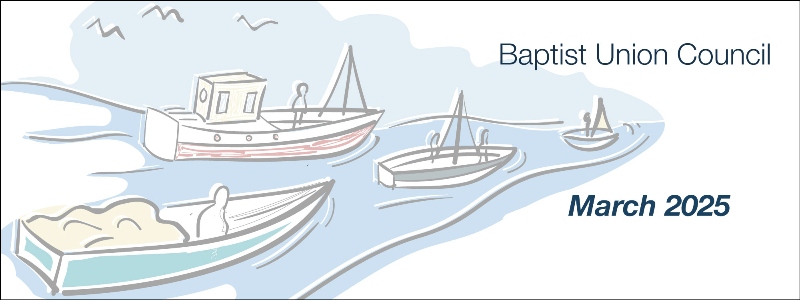
Scroll down for the following reports:
-
Worship and prayer
-
Committing to the formation of ministers and leaders
-
Baptist voices in the public square
-
Assembly Resolutions
-
Financial Model Review
-
BUGB Strategic Review
-
New member churches
-
Finance and pensions update
-
Key Roles Nominations
Worship and prayer
Baptist Union Council discerns the broad strategic direction of our Union, and the gathering was grounded in worship and prayer. 'We are here primarily as a worshipping community' said Council moderator Seidel Abel Boanerges, 'and in this context, we discern the mind of Christ.'
Council hosted a live prayer broadcast on the Tuesday evening, during which there was prayer for new churches and more baptisms, as well as lament for all that has been revealed by Project Violet.
Worship was led by Jane Henderson, Joint Regional Minister Team Leader of the North Western Baptist Association. She set the discussions in the context of the Easter story. 'Even in wilderness, we are resurrection people,' she said on Tuesday morning. 'Being in wilderness is not to deny the darkness, but to recognise the hope.
'I think we are on cusp of God doing something new in our lives as Baptists Together.'
For that to happen, Jane encouraged members to think about what we might need to let die in our shared life together.
'In order to change, we have to sacrifice. We can’t go straight to Easter without Good Friday,' she said.
On Wednesday Jane encouraged a focus on resurrection, taking Revelation 21:1-7 as her text.
'One of the things we need to do is stop telling our stories of death and decline... Stories where God is bringing new blossoms to flowers.'
She invited Council members to share their own resurrection stories - stories where we might glimpse God at work - both in plenary and on pieces of butterfly-shaped paper. The 'butterflies' were placed on the stage before being redistributed at the end of the gathering.

Committing to the formation of ministers and leaders
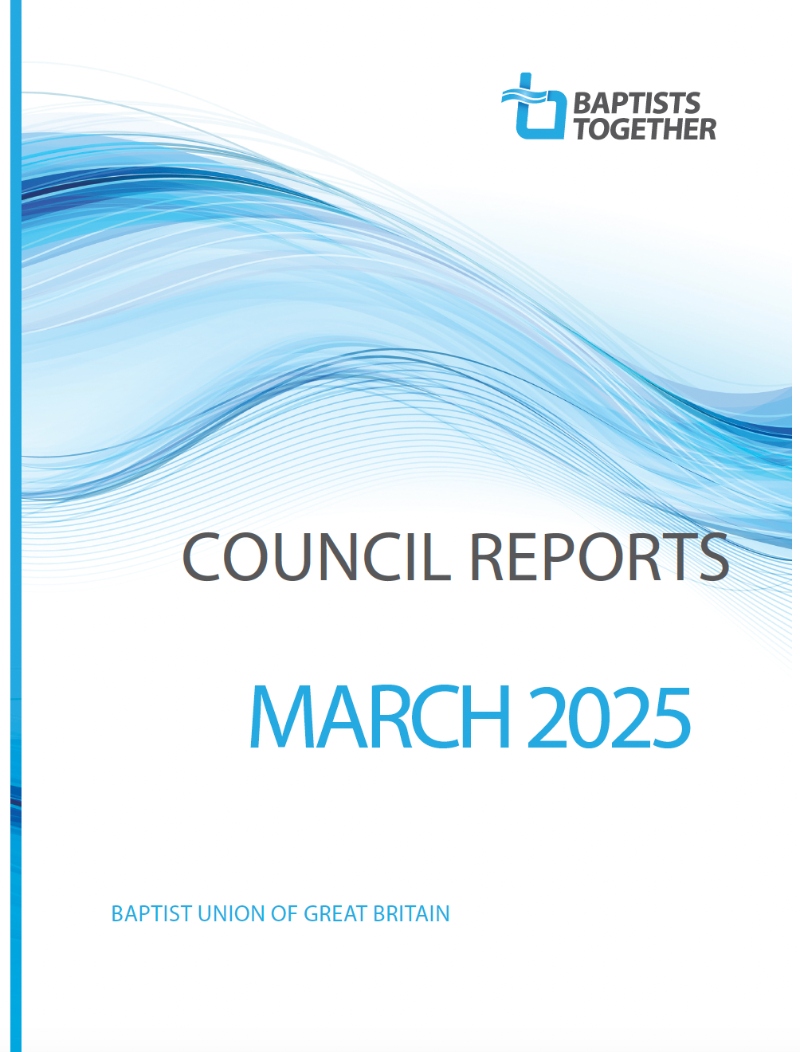 Why so few people are coming forward for training for accredited Baptist ministry – and possible ways forward for how this might be addressed – was explored by Council.
Why so few people are coming forward for training for accredited Baptist ministry – and possible ways forward for how this might be addressed – was explored by Council.
The session was led by Tim Fergusson, Ministries Team co-leader. Council was first presented with the decline in the number of accredited ministers in 2019.
Tim recently used his sabbatical to look in detail at the issue, speaking to more than 50 people from both within and outside Baptists Together. From this he and fellow co-leader Lee Johnson have sent a paper with findings and suggestions to regional teams and colleges.
He presented Council with a summary of that paper, before inviting members to discuss some of its findings.
Statistics
The total number of accredited ministers has declined by 16 per cent in the 2014-2024 period. There has been a rise in the number of ministers serving in roles outside of our churches, meaning the number of accredited ministers available to pastor and lead our churches has declined by 24 per cent.
The number of churches with a membership of over 40 (a very rough guide as to their ability to afford to pay a stipend) has declined by 23 per cent.
The rate of decline in the number of accredited ministers is likely to accelerate. This is because a disproportionate number are due to retire in the next ten years, and because there has been a collapse in the numbers entering training in the last three years.
Reasons for decline
Tim highlighted possible reasons for this decline. While the cost of training is a factor, ‘the situation is more complex’, he said.
These include: a diminished understanding of discipleship in a younger generation; the unattractive nature of church ministry in the current context – ‘whether real or perceived’; uncertainty over the direction of the denomination; hesitancy in our structures over younger candidates; lack of clarity about training; lack of development of possible candidates by existing ministers; and the availability of the lighter training route that leads to becoming a Recognised Local Minister.
Emerging themes
There are things we can do to make accreditation and our existing formation pathways more compelling and easier to understand and explore, the paper stated.
However, just doing this is ‘insufficient’, Tim’s conversation partners felt.
Several themes emerged. There was a desire to see an increased emphasis on:
-
Accompaniment and apprenticeship-style learning
-
Locally-hosted learning communities in which digitally-sourced teaching is accessed and reflected on theologically by a facilitated group of learners
-
Bi-vocational ways of training
-
A portfolio route to accreditation, disconnected from a university-validated qualification, in which MiTs provide evidence of fulfilling a matrix of theological learning, ministry experience, and participation in spiritual formation. Prior learning and experience can be taken into account
-
Investment in local leader training and the RLM route
-
Ways of encouraging a sense of belonging to a common Baptist vision of ongoing development among all learners at every stage – from the church member who wishes to be a better worship leader right through to the experienced minister practising CMD
-
Asking and training existing ministers to be better recruiters
 In the light of the above, the vision is for a Baptist-specific ‘formation ecosystem’, the briefing paper stated.
In the light of the above, the vision is for a Baptist-specific ‘formation ecosystem’, the briefing paper stated.
The ecosystem is made up of individuals and organisations/groups. The latter provide a landscape of opportunities for learning and development, offered by associations, colleges, networks, training courses and placement churches.
These training providers are interdependent through their collaborative working and the sharing of resources and best practice. They are non-competitive.
The individuals are the learners/trainees who can easily understand and access the various options and move between them. This community encompasses church leaders seeking new skills, those exploring a calling, those training for recognised ministry, and those already accredited who practise CMD.
The paper continued: ‘Success lies therefore not just in an increase in the number of accredited ministers, but in the rise in the formation – that is, the appropriate knowledge, capability and character – of ministers and leaders across all of Baptists Together. This will serve every church and missional project, whether or not they are overseen by accredited or recognised ministers.
‘So, the formation ecosystem is another way of describing a culture of lifelong learning.’
Tim invited Council members to discuss which of these emerging themes resonated the most, and responses were fed back in plenary.
Next steps
The Ministries Team is talking through the paper and its recommendations with the RMTLs and the Baptist College Partnership, and welcomes comments and input from others.
If broad agreement on the general direction is found, then a working group will be formed to determine how we can best realise the formation ecosystem.
Earlier Tim shared how more than 1200 accredited ministers and nationally recognised pastors had completed the I Am Because You Are equality and diversity training.
This was mandated by Council in 2021 following a letter from more than 150 ministers prompted by the events surrounding the murder of George Floyd.
I Am Because You Are was launched by Ministries Team in the autumn of 2022, and ministers had until the end of 2024 to engage with it. The programme is now finished.
A very small number of those who should have completed the training chose not to do so. In the light of Council’s earlier decision to make this training mandatory, national MRC has removed their accreditation.
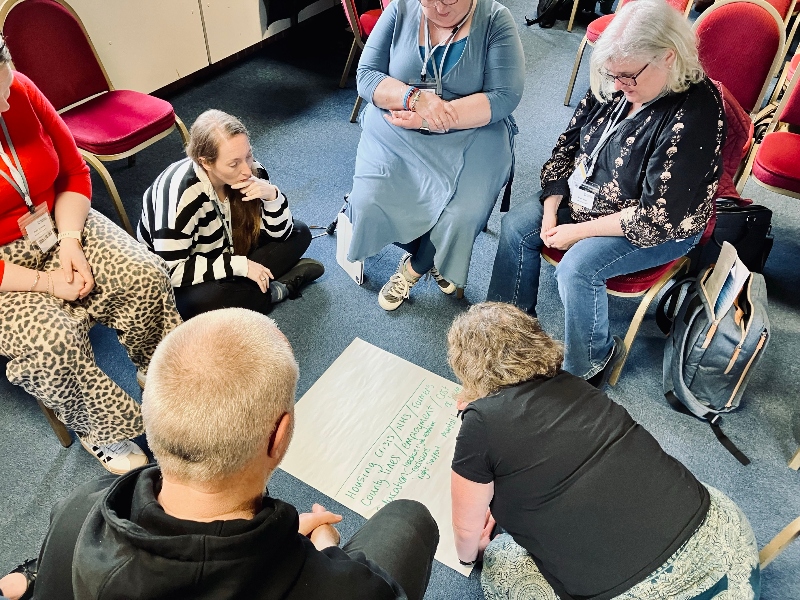
Baptist voices in the public square
The challenging realities in our world can be overwhelming. There are many current issues impacting the most vulnerable people in both our communities and the wider world. What as UK Baptists could we, and should we, be saying? And what role does Baptist Union Council have in this?
That was the premise of a session on Tuesday afternoon ‘Baptist voices in the public square - a cry or a whimper?’, led by Public Issues Enabler Steve Tinning.
Enabling Baptist voices and action in the public square is one of the five key areas of our work as Baptists Together, alongside equipping our existing local churches for mission, planting more churches and pioneering in new ways, and investing in Godly leadership and Specialist Support.
Steve stressed much is happening in this area, particularly through the work of the Joint Public Issues Team, yet 'the strength of the mandate in which we speak is getting weaker, not stronger, and that's what we're trying to address.
He also introduced Council members to the Constituency Action Network (CAN), which aims to enable local churches to speak and act for justice by building meaningful relationships with their MP.
Steve led Council members through a series of exercises to unpack these themes.
First, he encouraged them to find words which might characterise the public square at the moment, or the mood of the nation. Words and phrases such as divided, tired, anger, uncertainty, resigned, hopeless, lie, toxic, despair and lack of trust were shared.
Around tables, he then invited members to discuss some of the most profound issues we could and should have been speaking into over the last year, locally, nationally and internationally.
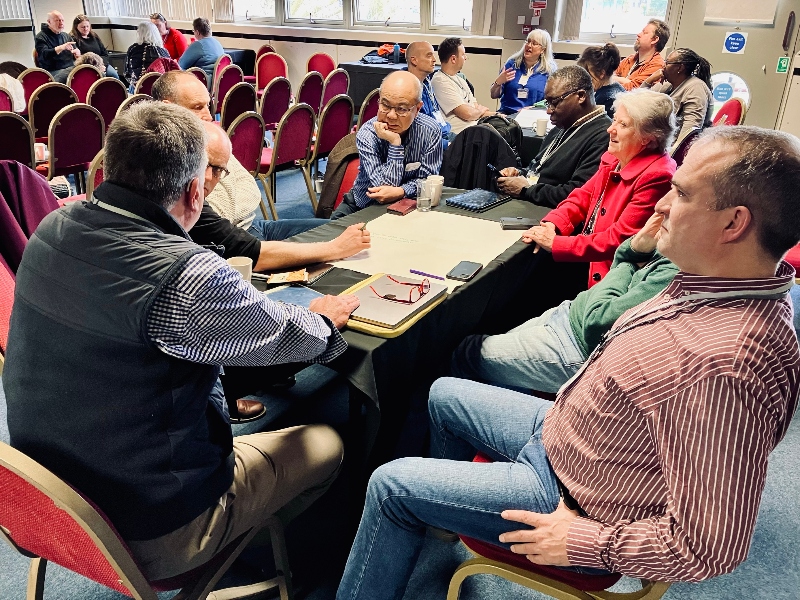
The next discussion point invited them to consider what issues are coming down the road. Both elicited a wide range of concerns.
Steve gave a brief introduction to the work of the Joint Public Issues Team, of which he is a member, in addressing societal issues. JPIT has six hopes for society: a just economy that enables the flourishing of all life, a world that actively works for peace, a society that welcomes the stranger, a society where the poorest and most marginalised are at the centre, a planet where our environment is renewed, and for a politics characterised by listening, kindness and truthfulness. These hopes have been in place for several years and are reflected in various actions and statements by the team.
For instance, Steve highlighted the issue of child poverty in the UK, with 4.3 million children living in households with incomes below 60 per cent of the average. There is concern that another 400,000 children may fall into poverty unless action is taken soon. A letter, signed by Lynn Green alongside other faith leaders, was recently sent to the co-chairs of the Child Poverty Task Force, urging more ambitious action to address this issue.
JPIT has consistently spoken out against the hostile environment against asylum seekers and refugees, targeting the Nationality and Borders Bill, the Rwanda Bill, and the Illegal Migration Bill in recent years. A statement about the latter was signed by 1500 church leaders, including nearly 300 Baptist church leaders. It received media attention and was discussed in the House of Lords.
Steve also highlighted several areas where there has been action, such as peace and conflict resolution, the environment and climate action, and shared an introductory video to JPIT's Future of Arms resource. All our statements have a theological foundation to them, because 'that is our unique contribution to these public square conversations'.
But while much is going on, Steve asked Council members to reflect on whether more could be done.
He explained it's hard to find our voice in the public square when the issues are particularly complex. One example is Israel and Palestine. We have joined a couple of statements on Israel and Gaza calling for a permanent ceasefire and the release of hostages, access for humanitarian aid and a just peace in which all people in Israel and the Palestinian territories can live in security with dignity.
But while feedback has been mixed on the whole, 'we get more people concerned that we are not saying nearly enough on Israel and Palestine,' Steve explained. It is difficult to go further as we have rarely discussed Israel and Palestine in any depth as a Union. This example highlights how the strength of the mandate in which we speak is getting weaker, in part because there have been no Assembly resolutions on public issues since 2011, and Council is discussing them with less regularity. (The last one was the divestment debate in 2021).
Steve invited members to reflect on the role Council has in guiding our response in the public square. Council is the representative body tasked with discerning the broad strategic direction of our Union. Could it have more of a role in determining principles that guide Baptist responses to issues? The idea from one member of gathering small groups of Baptists with expertise in an area was well received, as was the regular bringing of a justice issues to Council. Making space for frequent national discernment will help resource our churches, Steve said.
Resourcing local churches has become a key aspect of JPIT's work, he continued. He shared that for all the coverage JPIT's statements have received, both in the national press and in UK parliament, they have made little tangible difference to policies.
One response is the Constituency Action Network (CAN), which has a goal of establishing a network of at least one CAN church in every Westminster constituency in England, Scotland and Wales. Many churches are experts in social action and local issues, running food banks, warm spaces and more, but the idea of CAN is that 'we can take our social action one step further by challenging systems that allow people to fall upon hard times in the first place by engaging with politics,' the CAN website states.
'We believe this is best done in a way which priorities relationship, listening, kindness and truthfulness, avoiding party politics and working positively with MPs whether we voted for them or not.
'CAN Churches are offered resources and training from the Joint Public Issues Team, in order to help them on this journey.'
For more, see: jpit.uk/can
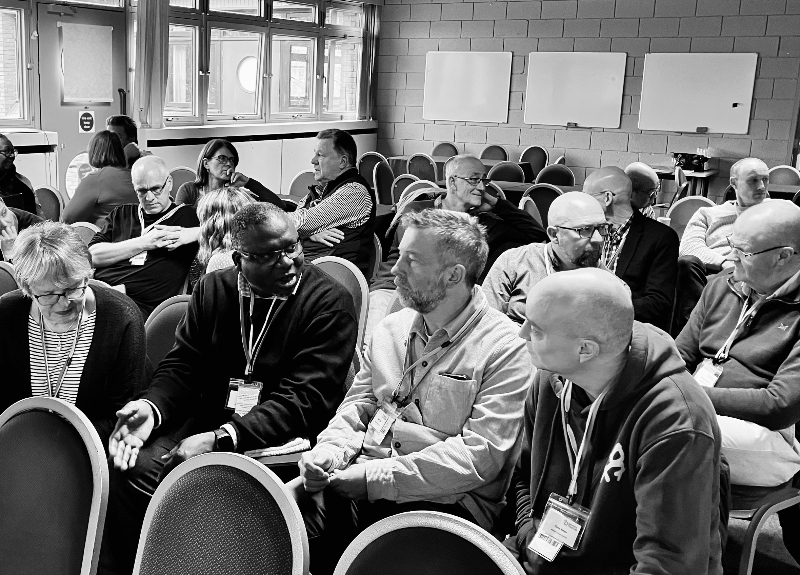
Assembly resolutions
Council members were asked to reflect on the role of resolutions and national discernment at Assembly.
The discussion came about because a resolution has been received from Mission Forum to Assembly 2025, as part of Assembly’s focus on mission, with a view to articulating a shared understanding of mission across Baptists Together.
However, in recent years resolutions at Assembly have slipped into disuse, with the last one being in 2011.
The BUGB constitution allows for a form of majority decision-making, appropriate for formal business and public statements decision making to rest with Assembly, the briefing paper noted.
The paper highlighted a list of Assembly resolutions dating back to 1970, when there were resolutions on European Conservation Year and Protests Involving Violence, to the most recent – Taxation – in 2011.
‘This is about Baptist identity, enabling the local while speaking nationally,’ said Diane Watts, Faith and Society Team Leader, as she introduced the session. ‘Why haven't we held resolutions since 2011? And what does that mean for us going forward?’
Diane invited Council members to gather around tables to discuss those questions, before inviting responses in plenary. Several reasons were offered. Resolutions haven’t happened since the structural reorganisation known as the Futures Process – our time at Assembly is shorter, and there is no Faith and Unity Department which organised the resolutions. Some members questioned the impact of past resolutions.
Others spoke of our ability to hold difference, a fear of what could happen, and a need to regain skills to do this well. Could such a space could be modelled moving forwards? There was value in the old model, but thought is needed for how it might be done today. Could local churches be invited to discuss briefings, and send delegates to Assembly?
‘There is a desire to have conversations,’ said Diane, summing up. ‘We want to talk together, but we want to do it well. We want to hear the concerns of local churches.’
Council members’ discernment was also sought on the specific resolution from Mission Forum, and its inclusion in Assembly this year. Council is the body which determines whether a resolution moves forward to Assembly.
The resolution process sees it going first to the General Secretary and to Trustees, who had expressed concerns about the timing, Diane noted. Assembly will have a focus on mission from 2025-27. This year BMS is helping local Baptist churches understand what has been learned globally, and applying that in a local sphere. There will be a different focus in 2026 and 2027.
Again this was discussed around tables, with responses summed up in plenary.
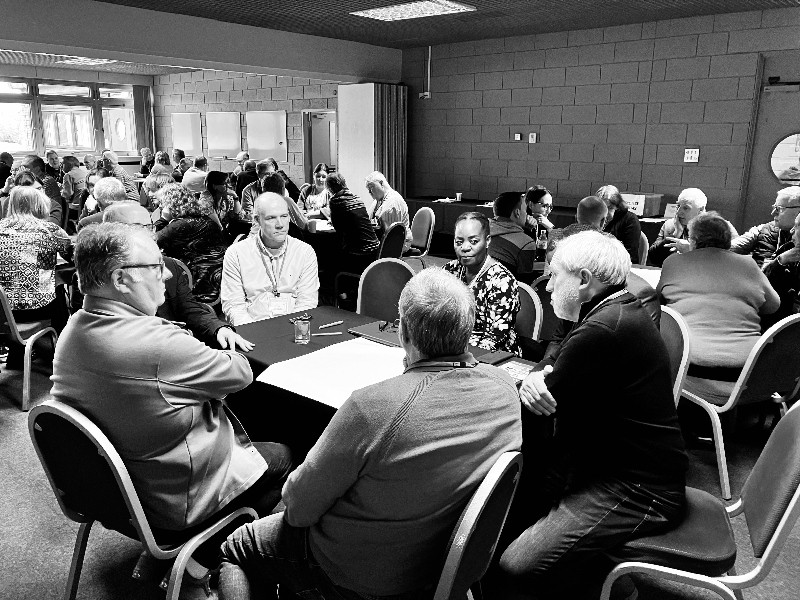
While it was felt that such a statement is something we can unite around, there was a general sense of ‘not yet’, that perhaps the resolution could emerge at the end of the three-year Assembly cycle. There was concern about the process – sending this to Assembly now didn’t leave a lot of time for local churches to discuss it. Waiting also enabled more of a bottom-up approach, where churches could be invited to live out and then share their own stories of mission.
This was reflected in the subsequent vote. Members had three options. The second one – presenting the resolution for reflection at Assembly 2025 and for decision at Assembly 2027 was the most popular, receiving 48 votes. Nine members voted to present the resolution for decision in 2025, while seven opted for neither.
Members of Mission Forum present at Council expressed their support for the decision to come to Assembly 2027, allowing Baptists to reflect and consult locally in order to come to a shared understanding of mission.
Financial Model Review
 Council members voted to move to extend the timeline for the Financial Model Review by one year, meaning we will begin transitioning to a new way of working in 2027, not 2026.
Council members voted to move to extend the timeline for the Financial Model Review by one year, meaning we will begin transitioning to a new way of working in 2027, not 2026.
They also approved extending the transition fund from two to three years.
The FMR aims to make Baptists Together financially sustainable in the future, for the benefit of local mission and ministry. At a specially convened Council in June 2024 members agreed four resolutions relating to the FMR.
While much progress has been made since June, there has been a ‘degree of difficulty’ relating to a new Finance Agreement, explained Support Services Team Leader Chris Jones. ‘Such a scenario is not unusual during the early stages of a major change project,’ he said.
This Agreement will replace the current byelaws. Currently the funds raised by Associations from churches goes into a central pot before being redistributed. The ‘uncertainty and hesitation’ relates to whether there should be a redistributive element of a change in money flow, and what income sources should be included in a percentage to fund BUGB.
Hayley Young, regional minister co-team leader of the Southern Counties Baptist Association, and David Mayne, regional minister team leader of Eastern Baptist Association, also spoke on this issue, as they brought an update from the recent meeting for the Regional Minister Team Leaders (RMTLs).
The gathering aimed to 'define the reality'. There was disagreement, but all agreed that something needed to change, and that Associations would commit to working towards that, said Hayley. The leaders identified several threats, of which there was 'synergy' around three.
They created three working parties that would look into the implication and practicalities of specific issues.
'There is a commitment to serving our churches well, and so we are committed to being part of the solution, and not in holding things back,' said Hayley.
David added that the time had been ‘very constructive’. There had been a focus on covenantal relationships, and to what extent we are committed to moving forward together and making it work.
'We shared ideas about what that might look like, about how as Associations, we might work better and develop more glue with each other, and with our colleagues at Baptist House, particularly in roles relating to comms and technology.’
More therefore needs working through than was on the table in June 2024, explained Chris. He invited Council to consider an alternative timeline, or roadmap, for the FMR.
Lynn Green, General Secretary, also spoke briefly to help members' discernment.
The FMR is concerned with the flourishing of our movement, to participate in God's mission, and in this sense the FMR is more than a financial review, she said.
It's a dynamic situation with 'lots of threads emerging', and an adjustment was needed.
Lynn invited Council to discern whether this is 'kicking the can down the road', or ‘a carefully thought through and needed adjustment.’
Key elements in the revised timeline included
-
Changing the Transition fund from 2 years to 3 years (it still begins in 2026, but now ends in December 2028, not December 2027)
-
Establish working groups on three threads relating to structure in May 2025
-
Work out principles for a 3 Year Transition Fund with Association Treasurers
-
Remove the planned change in money flows (from January 2026) from this timeline - changing money flows remains an option, but it becomes unconfirmed in this timeline
-
Possible models being brought to Council for discernment and final agreement in March 2026.
-
Communication of changes to churches beginning in April 2026 and running through to at least January 2027.
-
Steps to the new model being taken in January 2027.
There were two resolutions. Forty-nine Council members Council members voted to adopt the new timeline, with 12 voting to keep the original. There were five abstentions.
The proposal to extend the transition fund from two to three years was even more clear cut, with 55 voting yes, six voting no, and three abstentions.
Earlier Chris and treasurer Mohan Pandian reported on progress so far.
The purpose of the FMR seems to be becoming better defined, said Mohan. Specifically seeing the growth articulated in our collective shared vision, and supporting and equipping our churches and ministries to achieve this; rightsizing our structures and resources for mission; and at least stabilising, preferably increasing our income.
The Financial Sustainability Working Group has been established. One of its remits is income generation, and on this it is planning to engage an external company to get a professional’s perspective.
Digital is a key element in the FMR. Mike Lowe, Baptists Together Communications Manger, and Helen Harris, of BMS, introduced the new joint legacy campaign I Will, which will launch officially in the summer. This is primarily a digital campaign, and shows the possibilities of generating income digitally.
The second digital avenue is pioneering and being incarnational in the digital space. Council members were shown a video featuring a conversation between Alice Cheeseman, who chairs the Baptists Together Digital Round Table, and Matt Souza, who has pastored solely in the digital space for more than a decade. If we are going to reach new people, we need a new strategy, was a key message they shared.
BUGB Strategic Review
Lynn Green led a session exploring progress on the strategic review of BUGB, the charity. This review is taking place as part of the Financial Model Review (FMR), and the conversations about money flow. The FMR has encouraged thinking about 'what BUGB absolutely must be doing to best achieve our purpose within Baptists Together and to survive and thrive as a charity.'
BUGB - The Baptist Union of Great Britain - refers to the charity in which the Specialist Teams sit. Baptists Together is the name of the collaborative peer movement encompassing churches, Associations, colleges and the Specialist Teams, a gathering of independent charities which share a common DNA and purpose, and covenant together because of that.
Lynn began by outlining BUGB's charitable objects, which are stated in its constitution. The overall object is ‘the advancement of the Christian faith, in accordance with the principles of the Baptist denomination.’ There are six objects which share more detail about how this can be fulfilled.
From these objects, four 'strategic anchors' have been identified we need to focus on for the flourishing of our movement. These are:
-
Strategic collaboration in mission
-
Developing Ministry
-
Specialist Support
-
Nurturing Baptist Identity
The review has continued by identifying a series of 'concrete outcomes' related to each of the strategic anchors. ‘We need to be focused on what we actually want to achieve’, Lynn explained.
Lynn highlighted some potential ideas related to these concrete outcomes, and stressed the need for more evaluation.
She invited Council members to gather around tables and discuss the question:
'Do the strategic anchors in your mind accurately reflect BUGB's distinctive role within Baptists Together?'
There was time for plenary feedback.
Lynn placed the strategic anchors and their concrete outcomes on boards around the room, and gave Council members four stickers each. She asked: 'For the thriving of our movement, what do we really need to invest in at this time?'. She invited members to indicate their preference through placing stickers on the appropriate boards.
Lynn had begun the session by explaining her heart for the flourishing of our Union.
'I really have a longing that we grow healthy churches that are great places to be, that bless people, ministers, church members and communities; churches that reflect our Baptists Together culture.
'I really want to nurture relationships that care more about the kingdom than our own agenda.'
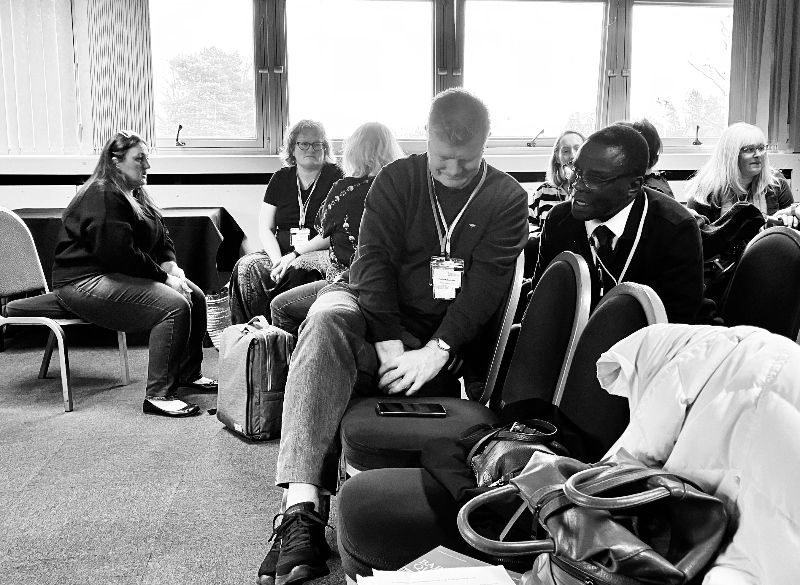
Finance and pensions update
Chris and Mohan gave a finance and pensions update. Regarding pensions, Mohan told Council the Defined Benefits scheme buy out was completed in November 2024. The Defined Contribution scheme will be reviewed to make sure it's still fit for purpose.
Regarding general finance maters, BUGB ran at a deficit of £340,000 in 2024; this is far from ideal, but better than had been forecasted (£700,000), said Chris. We are expecting another deficit, though our income streams are budgeted very conservatively.
We are continuing to look at ways of boosting income, including a new legacy campaign, and changing how our shares portfolio is managed which resulted in a £30,000 increase in funds in 2024.
The Baptist Union Corporation's performance also increased in 2024. However, an element of this is related to the Family Solution loan - an intercompany loan between BUC and BUGB, with RBMHO’s property portfolio providing security. This will also need to be reviewed in light of some challenges the loan model is facing.
This in turn impacts money available to Associations. It will need to be reviewed in light of the FMR.
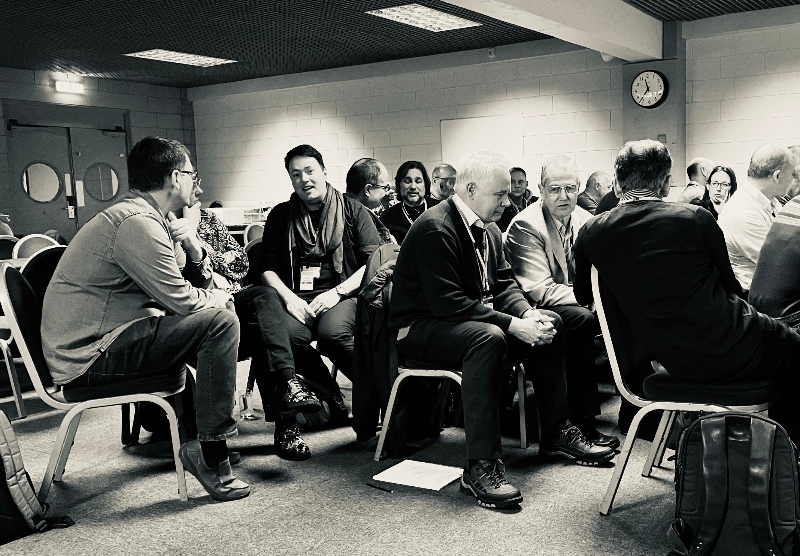
New member churches, Local Ecumenical Partnerships, closures and more
Five churches which have joined our Union were welcomed and prayed for, while members were also informed of four church closures, one new Local Ecumenical Partnerships, four churches ceasing membership of BUGB, and four amalgamations. There were also five church name changes.
The five new member churches are:
-
Ocean Church (SCBA)
-
Windrush Church (SCBA)
-
Airport Revival Baptist Church (LB)
-
Rivers of Life Community Church (SEBA)
-
The Ark Church (YBA)
‘God is at work drawing people to himself,’ said Council moderator Seidel Abel Boanerges. ‘I hope you are encouraged by these churches.'
Short videos were shown, in which the ministers of each explained the church context, why the church is joining our Union, and shared prayer requests.
There was one new Local Ecumenical Partnership:
-
Sherbourne Community Church (B/URC) (HEBA) - Joining of Hearsall Baptist and Holyhead Road United Reformed Church, Coventry
Council members were informed of four closures:
-
Porton Baptist Church (SCBA)
-
Glebe Farm Baptist Church (HEBA)
-
Fenton Baptist Church (HEBA)
-
Hope Baptist Church, Hebden Bridge (YBA)
Four churches ceased membership of BUGB:
-
St Agnes United Church LEP, Leeds (YBA) Church is continuing as Anglican only
-
West Swindon and Lydiard Tregoze Church Partnership LEP (WebNet) Church is continuing as Anglican only
-
Salem Baptist Church (LB)
-
Ebenezer Baptist Church, Llandeilo (Unassociated) Church continuing as a member of the Baptist Union of Wales only
There were four amalgamations:
-
Pinner Baptist Church and Hatch End Baptist Church have amalgamated to form Pinner Baptist Church (LB)
-
Emmaus Church and George Road Baptist Church have amalgamated to form The Connected Life Church (HEBA)
-
The Gate, Reading - Grovelands and Sindlesham Baptist Church have amalgamated to form The Gate Reading (SCBA)
-
Gillingham Baptist Church and The Bridge Baptist Church have amalgamated to form Gillingham Baptist Church SEBA)
And five name changes:
-
Longheath Baptist Church to Penge Bible Church (LB)
-
Pentecost Baptist Church to Zion Baptist Church (LB) NB We previously reported that the wrong Pentecost Baptist Church had changed its name
-
Blenheim Baptist Church to Olive Tree Church (CBA) (LEP with Methodist Church)
-
Southfields Baptist Church to Everyday Church Southfields (LB)
-
Stoborough Baptist Church to Harbour Church Purbeck (SCBA)
Seidel prayed for all the churches listed, including for the members of those which have closed.
Key Roles Nominations Team
Barbara Carpenter presented her first ever report as moderator of the Baptists Together Key Roles Nominations Team. Barbara was appointed at the last Council, and succeeds Rupert Lazar, who had led the team since it was reconfigured following the Futures Process in 2012.
The Key Roles Nominations Team serves Council by discerning and nominating those called to key leadership roles, and is intentional in in reflecting the diversity of our Baptist movement in its work.
New moderator of the BUGB Trustee Board
 From April there will be a new moderator of the BUGB Trustee Board after Council voted overwhelmingly to support the Team’s nomination of Peter King.
From April there will be a new moderator of the BUGB Trustee Board after Council voted overwhelmingly to support the Team’s nomination of Peter King.
Peter (pictured) is a lawyer who has recently retired from the role of Legal Director (general counsel) at HM Treasury. Here his role included leading a team of around 100 people and providing legal advice to the Chancellor of the Exchequer and other Treasury ministers, as well as to senior civil servants.
Peter is secretary of Chatsworth Baptist Church, and had been serving as vice moderator.
Current moderator Andrew Cowley had indicated he wanted to stand down at the end of March. The role was advertised, and following Peter’s application the Key Roles Nominations Team held a discernment day on 12 March.
‘We had a deep and prayerful conversation with Peter, and the Team believes he is right person for this moment,’ said Barbara.
Barbara expressed thanks for all Andrew had given, which began initially by serving as acting moderator during a vacancy, before being officially voted into the role in late 2022. At the end of Council Lynn also expressed huge appreciation and thanks to Andrew for the way he has served our Union, and prayed for him.
With Council’s approval, Andrew will also continue to serve as a Trustee until the end of his term in December 2025.
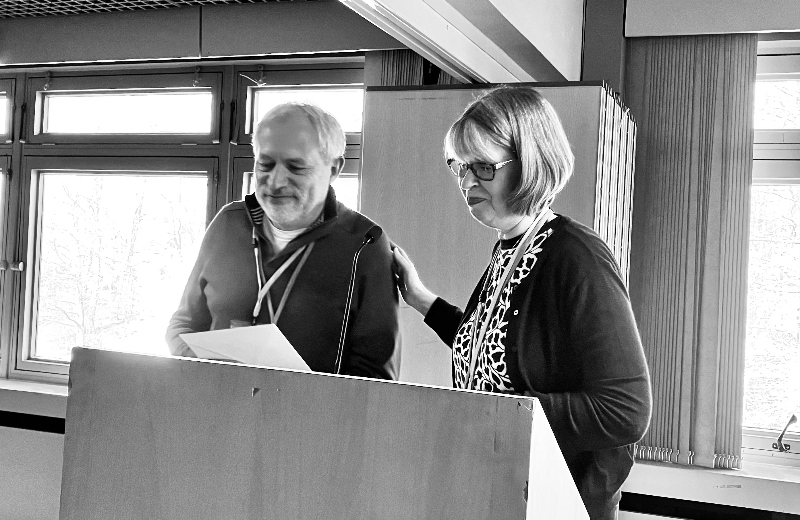
Further nominations and Key Roles updates
As well as voting Peter, Council members were asked to consider three further nominations.
These were for Jeniya Gwendu to serve a second term as a Baptist Union trustee, and for Adrian Semerene and Lois Delong to serve a third and final term as co-opted Council members. All three were overwhelmingly passed.
Elsewhere, Susan Stevenson has indicated her desire to step down as Moderator of the Ministerial Recognition Committee MRC in the summer, and Barbara expressed thanks for her service.
The role will be advertised as of the end of March. The Key Roles Nominations Team encourages Council to ‘join us in praying for God to lead us to the right person for this significant role,’ Barbara’s report noted.
We are still searching for a trustee with financial expertise. Such people are in ‘high demand, but short supply,’ Barbara said.
She reminded Council that Key Roles is a shared enterprise. ‘It requires us all to have our eyes and ears open.’
Baptist Times, 03/04/2025